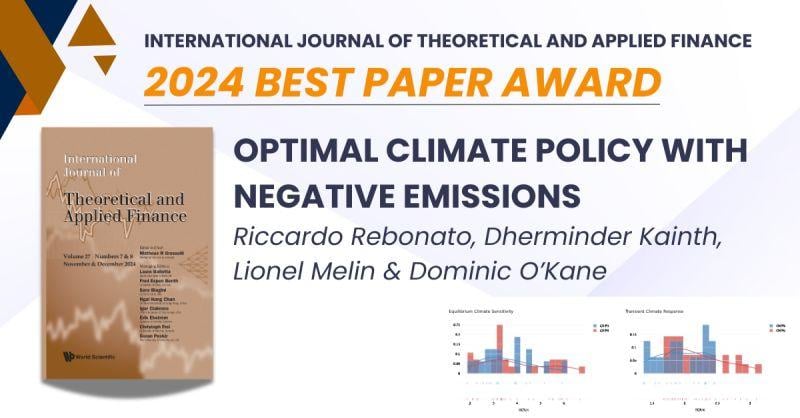EDHEC Climate Institute Researchers Win 2024 IJTAF Best Paper Award
EDHEC Climate Institute Researchers Win 2024 IJTAF Best Paper Award

The IJTAF Editorial Board praised the article “for an important contribution highlighting the fundamental role of negative emissions technologies (NET) to combat climate change using a significant modification of the DICE model that also aligns the physics of the model with state-of-art climate science.”
This award-winning paper tackles the critical question of how best to design climate policies that limit global warming while managing the economic and social challenges of decarbonisation.
By substantially updating the widely used DICE integrated assessment model, the authors demonstrate that:
Negative emissions technologies (NETs) must play a very large role in any optimal climate policy, alongside emissions abatement.
When both levers — abatement and removal — are employed, the Paris Agreement 1.5–2°C target by 2100 is not only achievable, but emerges as the optimal outcome.
Incorporating carbon removal enables a more gradual abatement pathway, reducing transition risks and social dislocations while still achieving lower long-run temperatures.
The study also considers the economic and policy implications, highlighting potential moral hazard risks and the logistical challenge of carbon storage, while stressing that removal must complement, not replace, ambitious abatement.
Reflecting on the award, the authors said:
“It is a great honour to have been granted this award. We would like to think that the choice has been at least in part motivated by the recognition that the rapid decarbonization of the economy required to limit the damages of climate change calls for a variety of tools and approaches. Emission reduction remains, of course, central, but, given the long thermal inertia of the climate system, we must also look at ways to actively remove carbon from the atmosphere, and store it safely. The techniques to do so in scale still need refinement, but our work suggest that pursuing this additional decarbonization path is not only reasonable, but optimal.”
The paper “Optimal Climate Policy with Negative Emissions” is freely accessible until December 2025: https://www.worldscientific.com/doi/full/10.1142/S0219024924500122
This award-winning study represents an important step in the EDHEC Climate Institute’s broader effort to develop a new generation of integrated assessment models (IAMs) tailored for finance. Our Climate Scenarios research programme complements benchmark pathways such as those of the IPCC and NGFS by adding probabilistic information and improving sectoral and regional granularity.
Through Scientific Climate Ratings, an EDHEC venture, these insights are now being applied in practice — delivering forward-looking climate risk ratings that reflect asset-level exposure and damages under probabilistic scenarios. This connection between rigorous academic validation and practical adoption highlights how EDHEC’s research directly supports investors, regulators, and policymakers in managing climate-related financial risks.
Selected EDHEC Climate Institute Papers:
How to Assign Probabilities to Climate Scenarios (Rebonato, Melin & Fangyuan Zhang)
Climate Scenario Analysis and Stress Testing for Investors: A Probabilistic Approach (Rebonato, Kainth & Melin)
How Does Climate Risk Affect Global Equity Valuations? A Novel Approach (Rebonato, Kainth & Melin)
Portfolio Losses from Climate Damages: A Guide for Long-Term Investors (Rebonato)
Selected EDHEC Climate Institute Papers articles:
Recalibrating climate risks: how to assign probabilities to climate scenarios
Why we need climate scenario probabilities and how to get them
Dealing with Climate Change: Asset Pricing Implications of Monetary and Fiscal Choices